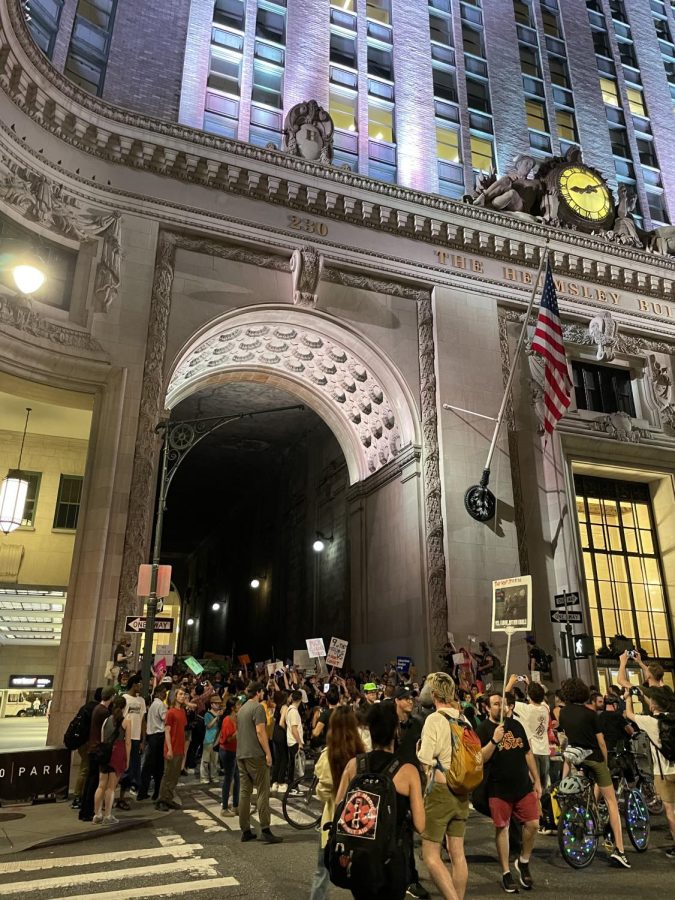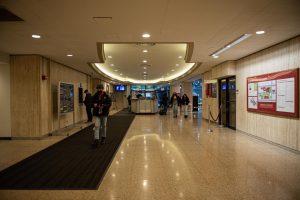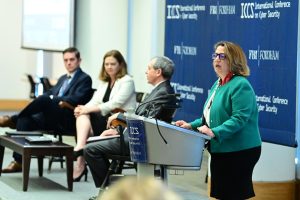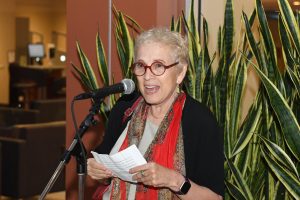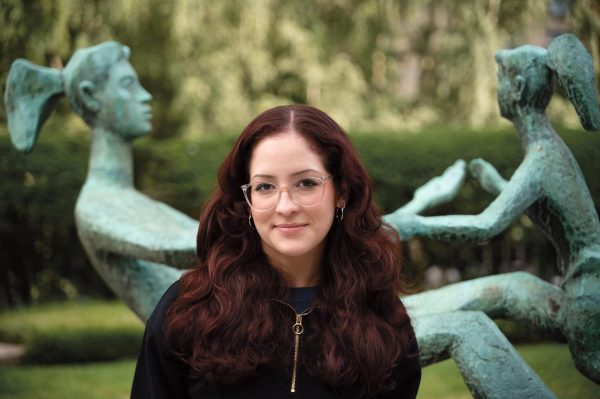Fordham Community Responds to Roe Reversal
Administrators, student groups and alumni express their opinions in the wake of the Supreme Court’s overturning of landmark case Roe v. Wade
Several activists gather at Bryant Park and Grand Central to protest the fall of Roe on June 24.
August 27, 2022
The U.S. Supreme Court’s decision on June 24 to overrule the precedent set by Roe v. Wade and Planned Parenthood v. Casey determined that abortions are no longer a constitutional right, leaving the decision to permit or deny abortions to individual states and their constitutions. Abortion access is protected in New York, but following the decision, different forms of abortion bans and restrictions immediately challenged access to abortion rights in other states.
Following the Roe v. Wade decision in 1973, abortion bans were repealed to allow for abortions to be a constitutional right, though some states passed trigger laws that were intended to ban abortion if the Supreme Court ever reversed its decision. Currently, some of the restrictions include consent laws, parental involvement, gestational bans and penalizations for abortion providers.
The case that overturned Roe, Dobbs v. Jackson Women’s Health Organization, was brought before the Supreme Court to challenge Mississippi’s Gestational Age Act, which mandated that unless a medical emergency or a fetal abnormality warranted an abortion, a person does not have the right to “intentionally or knowingly perform … or induce an abortion of an unborn human being” if the gestational age was past the 15-week mark. Jackson Women’s Health Organization argued that the right to an abortion was protected under the Constitution and cited previous precedents, including Planned Parenthood v. Casey in 1992 which reaffirmed the decision in Roe, to support this right.
The case was first presented in the U.S. District Court for the Southern District of Mississippi, which sided with Jackson Women’s Health Organization. Dobbs appealed to the Fifth Circuit Court, which also sided with the previous ruling in Dec. 2019. The case then made its way to the Supreme Court, which ruled that the Constitution does not provide a right to abortion.
In response to the decision, individuals and groups within the Fordham community have expressed their opinions regarding the decision. In addition, current students and alumni have taken action to provide support and aid to those impacted by the reversal and departments within the administration have extended their resources to students affected by the ruling.
Student Reactions and Mutual Aid Fundraisers
In response to the decision, students and alumni began fundraising on social media and posting infographics to break down the changes Dobbs would bring to abortion access across America.
Sophia Grausso, Fordham College at Lincoln Center (FCLC) ’24 and president of the Feminist Alliance at Lincoln Center, spoke on the importance of action and urged students to turn their feelings into effective action.
“We will all feel the effects of this precedent being overturned, which is why we need to be vigilant about voting, protesting and aiding those organizing resistance when we can,” she said.
Grausso and the Feminist Alliance hosted a fundraiser on Instagram, where they raised $40 out of their $100 goal. They donated the proceeds to the National Network of Abortion Funds and are awaiting the beginning of the school year to take additional action as a club.
“Reproductive rights are a form of healthcare, and healthcare is a human right.” Ritamarie Pepe, FCLC ’22 and co-founder and current editor-in-chief of grain of salt magazine
“We have (compiled) a list of resources that we hope to continue adding to as the semester goes on,” she said. “We’re hoping to (incorporate) bringing awareness and taking action in each of the events we put on this semester.”
She added that the Feminist Alliance is committed to using its platform on campus to fight against restrictive legislation and hopes to host more fundraisers at events throughout the semester.
“Even though we haven’t raised much, we’re hoping it slowly and surely adds up over the course of the year,” Grausso said.
Ritamarie Pepe, FCLC ’22 and co-founder and current editor-in-chief of grain of salt magazine, an online publication that publishes projects by female-identifying and nonbinary individuals, revealed that her immediate reaction to the ruling was one of concern for its effects on marginalized communities, the LGBTQ+ community and those falling below the poverty line.
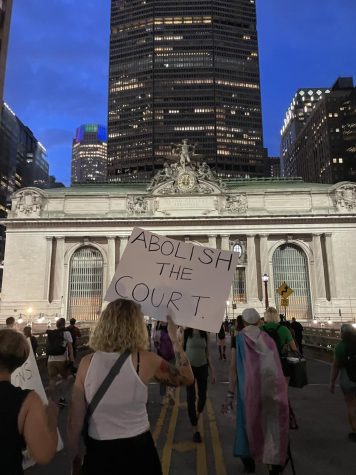
“Reproductive rights are a form of healthcare, and healthcare is a human right,” Pepe said. “Knowing the impact this will have on some of our most marginalized communities is very scary.”
To alleviate the repercussions that such groups would endure, Pepe introduced the idea of a fundraiser to the magazine’s editorial board. According to Pepe, grain of salt worked with the National Network of Abortion Funds and began their fundraiser following the ruling’s announcement on June 24. The magazine began with the goal of raising $200, but within two days, they accumulated over $1,350 in donations. Ultimately, the fundraiser raised $1,825.06 for the organization.
“It didn’t feel right to just sit and talk about it or share information,” she added. “I wanted to do something that I knew had an impact.”
Pepe emphasized that the watershed decision reaffirms grain of salt’s mission to continue being a space where creatives and marginalized communities can connect with other people who are upset and looking to channel their want for change into some form of creativity.
The Fordham College Republicans club and Fordham Respect for Life group did not respond for comment.
Responses From University Groups and Administration
In addition to students speaking on the decision, many Fordham groups and departments also contributed to the conversation.
The Fordham Undergraduate Law Review, a student-run publication that discusses legal issues at both the domestic and international levels, released a statement regarding the decision and noted the effect this decision had on the geographically diverse group of students, faculty, staff and administrators that make up the Fordham community.
“The laws which banned or severely limited access to abortion services lay dormant until Friday, when suddenly many members of our community had their constituionally guaranteed rights stripped away,” the statement read.
“Even before the decision was officially announced, we were already reflecting on how the potential overturning of Roe v. Wade could impact our students’ mental, emotional and psychological health and well-being.” Jeffrey Ng, director of CPS
The United Student Governments (USG) at both Rose Hill and Lincoln Center also released a joint statement in July expressing their “full support for all students who are directly and indirectly affected by this decision.”
Within their statement, USG recognized the variety of reactions the decision may produce within the Fordham community and included Counseling and Psychological Services (CPS) and University Health Services (UHS) as resources for students to seek out on campus.
“Our purpose as Fordham students is to raise our voices against injustices in society and fight for each person’s point of view in an equal and fair manner. We recognize and accept all points of view on the Supreme Court’s decision,” part of the statement read.
CPS released its own statement through its Instagram account and stated that it recognized the range of emotions among students as a result of the Supreme Court’s decision and encouraged students to reach out and speak to a counselor if they are struggling, feel overwhelmed or need support.
“We encourage any student who has concerns over their personal or sexual health to contact UHS and make an appointment with a provider.” Maureen Keown, UHS director
Jeffrey Ng, director of CPS, noted that the statement was released with the intention of reassuring students that their mental health would be attended to in the wake of Roe’s reversal.
“Even before the decision was officially announced, we were already reflecting on how the potential overturning of Roe v. Wade could impact our students’ mental, emotional and psychological health and well-being,” he said.
Similar to Pepe’s concerns, Ng noted that CPS was mindful of both the individual and broad implications this ruling will have on the rights of historically oppressed groups.
“We wanted our students to know that there are supports available for them regardless of whether they were concerned about the reversal of Roe v. Wade or the potential impact that that decision could have on other legal precedents,” Ng noted.
UHS director Maureen Keown said that “UHS is available to assist and support all students with any medical needs including issues related to sexual health and pregnancy.”
“Again, I think I cannot stress enough that a reproductive justice agenda is not limited to abortion access, but rather seeks to build and imagine a world that supports the bodily sovereignty and self-determination of all people.” Diane Detournay, professor of English and women, gender and sexuality studies
Keown added that UHS does not prescribe birth control except for “medical conditions such as acne, irregular periods, heavy periods, cramps, (and) polycystic ovary syndrome with supporting medical documentation.” According to Keown, UHS also provides education on safe sex and STI prevention, screening and treatment.
“We encourage any student who has concerns over their personal or sexual health to contact UHS and make an appointment with a provider,” she said. “UHS is a safe and confidential resource for all students.”
Roe’s Reversal and Its Impact on Teaching and Education
The overturning of Roe v. Wade has caused professors to consider the impact the landmark decision may have on their coursework and marginalized communities in the greater context of the American abortion debate.
Over a year before the Supreme Court’s decision, Fordham’s Center on Religion and Culture (FCRC) hosted a panel on the abortion debate in America on Jan. 27, 2021. It was moderated by the center’s director, David Gibson, and FCRC invited experts and faith-based voices to discuss the argument over abortion rights. In an interview with The Observer on Aug. 10, Gibson spoke about the relevancy of this panel to Roe’s recent reversal and the conversations that are expected to come.
“The panel we hosted on this topic last year was a wonderful surprise in that it proved to be a genuinely engaging and constructive and generous conversation on a topic so fraught I hesitated to do anything on the abortion issue,” he said. “I couldn’t envision what sort of constructive engagement we could have on such a polarized topic.”
Diane Detournay, professor of English and women, gender and sexuality studies, said that the decision will impact her teachings in the classroom, with a focus on how students can organize at Fordham.
“Again, I think I cannot stress enough that a reproductive justice agenda is not limited to abortion access, but rather seeks to build and imagine a world that supports the bodily sovereignty and self-determination of all people,” she said.
Pepe echoed this sentiment and believes that the best thing people can do currently is “support other people and be there for them, knowing what this (decision) means.”

